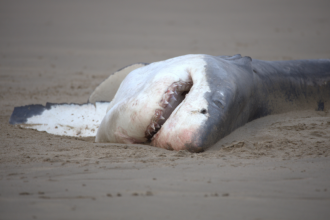-
Humanity must start living within its means
UN Environment Programme
Rich countries use six times more resources, and generate 10 times the climate impacts than low-income ones, far exceeding human needs and nature’s capacity, according to a new report by the UN Environment Programme. The 2024 Global Resource Read more about Humanity must start living within its means
InternationalUN Environment Programme -
Obesity is linked to a higher risk of stillbirth, especially as the baby approaches full term
Canadian Medical Association Journal
Obesity is linked to a higher risk of stillbirth, and that risk increases as the baby approaches full term, according to international researchers. The team say the link between obesity and stillbirth is well-known, however, less is known about how Read more about Obesity is linked to a higher risk of stillbirth, especially as the baby approaches full term
InternationalHarvard University, USA -
Nanothin printing of electronics hardware could slash costs
Small
Engineering researchers have developed a 2D printing process using liquid metals that they say could create new ways of creating more advanced and energy efficient computing hardware that is manufactured at the nanoscale. Nanothin printing of Read more about Nanothin printing of electronics hardware could slash costs
Australia; International; NSW; VICThe University of Sydney|The University of Melbourne... -
Victoria’s feral cats move in for the kill after control programs cut fox numbers
Conservation programs that control foxes in order to protect Victoria’s endangered and threatened native animals may be inadvertently giving space for feral cats to thrive, according to research by the University of Melbourne. In a paper published Read more about Victoria’s feral cats move in for the kill after control programs cut fox numbers
Australia; VICThe University of Melbourne -
From carbon to clouds - Ocean detectives return with climate clues
The longest science voyage by CSIRO research vessel RV Investigator has returned to Australia with one of the most comprehensive datasets ever collected in the Southern Ocean. Over 60 days and 12,000 kilometres, the voyage led by the Australian Read more about From carbon to clouds - Ocean detectives return with climate clues
Australia; International; TAS; ACTUniversity of Tasmania|Australian Antarctic Program Partnership -
Spontaneous curvature the key to shape-shifting nanomaterials
Proceedings of the National Academy of Sciences
Inspired by nature, nanotechnology researchers have identified ‘spontaneous curvature’ as the key factor determining how ultra-thin, artificial materials can transform into useful tubes, twists and helices. Inspired by nature, nanotechnology Read more about Spontaneous curvature the key to shape-shifting nanomaterials
Australia; International; NSWARC Centre of Excellence in Exciton Science|The University of Sydney... -
Few hospitals include stop smoking services in their lung cancer care
Respirology
Only 4. 5% of Australian and NZ lung cancer care centres include services to help people stop smoking, according to new research. The survey of lung cancer doctors, which covers about 85% of the centres treating lung cancer in Australia and 100% Read more about Few hospitals include stop smoking services in their lung cancer care
Australia; New Zealand; NSW; VIC; QLD; WACurtin University|The University of Melbourne|The University of New South Wales... -
National registry to improve the health of deaf and hard of hearing children
The health and well-being of deaf and hard-of-hearing children will significantly improve under the first national system that can track their care. Research at a Glance:The health and well-being of deaf and hard of hearing children will Read more about National registry to improve the health of deaf and hard of hearing children
Australia; VICMurdoch Children's Research Institute (MCRI) -
Killer whale observed hunting great white sharks solo for the first time
African Journal of Marine Science
A solo orca (killer whale) has been observed by scientists individually hunting and eating a great white shark, a feat that scientists say has never been seen before. According to the orca researchers who witnessed the event, orcas have been Read more about Killer whale observed hunting great white sharks solo for the first time
InternationalRhodes University, South Africa -
The Covid-19 pandemic put Antarctic research on ice
SCIENCE ADVANCES
Covid-19 had a profound impact on international cooperation and governance in Antarctica, new Canterbury-led research has found. The pandemic also significantly impacted research funding, fieldwork operations and career development for scientists Read more about The Covid-19 pandemic put Antarctic research on ice
New Zealand; InternationalUniversity of Canterbury|British Antarctic Survey, University of Johannesburg










































